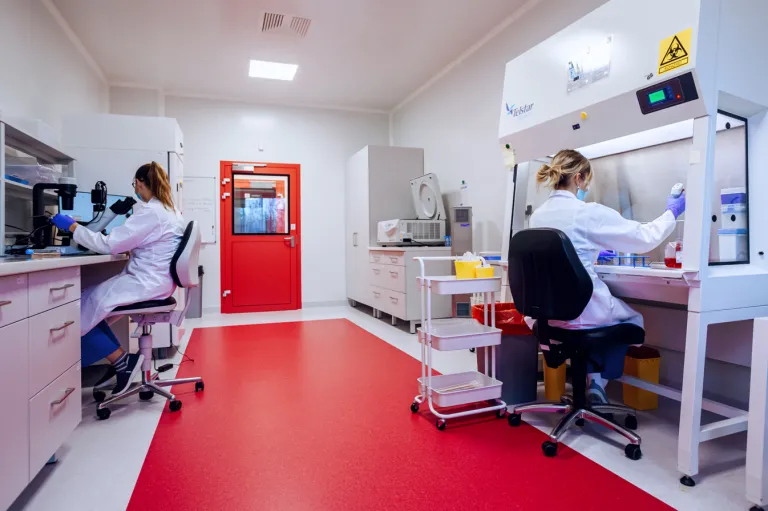During pregnancy, along with other changes in a woman's body, the pharmacokinetics of many drugs also change. Some of them pass through the placenta and can adversely affect the fetus, leading to serious defects and impeding its development. What drugs should pregnant women definitely avoid? Are over-the-counter drugs always safe for them?
Changes in the effects of drugs during pregnancy are due to a number of modifications that occur in the woman’s body during the nine months. The motility of the gastrointestinal tract is then reduced, and the pH of the stomach increases, so that drug absorption is altered. In addition, during pregnancy, the volume of blood and the amount of body fat increase, which affects the distribution of drugs in the pregnant woman’s body. Renal flow and glomerular filtration in the kidneys are also increased. These and other changes that occur during pregnancy affect the often necessary modifications of dosages or medications used in pregnant women. This is a unique group, in which it should always be remembered that a particular treatment can also affect the developing child at the same time.
Drug safety during pregnancy
In order to determine the safety of drugs during pregnancy, the U.S. Food and Drug Administration (FDA) in 1979 proposed a division into 5 categories, in terms of the harmfulness of drug use during pregnancy and thus the potential impact on the fetus. Category A included drugs whose use had been studied in pregnant women and were considered safe for the baby. Category B medications are also relatively safe, but have not been tested on pregnant women. Categories C and D included drugs that had negative effects on the developing child and could only be used in exceptional cases. Category X denoted drugs with proven harmful effects on the developing fetus, which must not be used not only during pregnancy, but also while of reproductive age.
In 2015, the FDA changed this classification to PLLR (The pregnancy and lactation labeling rule). The main thrust of the change is a thorough description of each drug regarding its safety and the studies conducted to date. It also divides each drug into 3 categories: pertaining to pregnancy, lactation and reproductive period.
The safety of each drug can also be checked in the Summary of Product Characteristics, where each is described based on a classification created by the EMA (European Medicines Agency).
Teratogenic drugs – what are they?
This is the name given to a group of drugs that primarily cause severe birth defects, especially of the nervous system and cardiovascular system in the fetus. They are particularly harmful at the beginning of pregnancy, during the organogenesis taking place in the child. If exposure to a teratogen occurs between 4. a 8. week of a baby’s development, it may develop limb and oral defects. Defects of the eye, teeth or genitalia may also appear. The harmful effects of drugs depend on the dose and duration of their action. In addition, these drugs can lead to fetal growth restriction, preterm labor and complications in infancy. Teratogenic drugs include warfarin, thalidomide and valproic acid, among others.
Painkillers in pregnancy
What if headaches occur during pregnancy? Paracetamol is considered the safest painkiller during pregnancy. Non-steroidal anti-inflammatory drugs (NSAIDs) (including ibuprofen) should be avoided, as they increase the risk of bleeding in the 1st trimester , and in the 3rd. trimester lead, among other things, to premature closure of the Botall’s duct in the baby’s heart, which can result in pulmonary hypertension. In addition, NSAIDs reduce placental flow, impair fetal renal function or reduce amniotic fluid production. It should be used only if absolutely necessary.
Acetylsalicylic acid, classified as a non-steroidal anti-inflammatory drug, is used in low doses in pregnant women for the prevention of preeclampsia (pre-eclampsia). However, it should not be taken on its own as a painkiller, because in addition to its negative effects on the fetus, it risks complications such as hemorrhage after delivery. A pregnant woman taking acetylsalicylic acid should always take it under medical supervision.
Strong painkillers – opioids, do not have teratogenic effects, but should be avoided, especially in III. trimester due to the development of addiction in the child and the occurrence of abstinence symptoms in the newborn.
Antibiotics in pregnancy
During bacterial infections, the most recommended drugs for moms-to-be are those in the penicillin and cephalosporin groups. Amoxicillin or fosfomycin is recommended for urinary tract inflammation, which often occurs among pregnant women. Antibiotics from the group of tetracyclines and fluoroquinolones, as well as aminoglycosides, are contraindicated during pregnancy. The latter can cause deafness in a child. Taking tetracyclines by a pregnant woman has been shown to lead to bone growth disorders and discolored teeth. Quinolones, on the other hand, can result in damage to the child’s joint cartilage. A popular antibiotic commonly used to treat infections such as. Helicobacter pylori – metronidazole, taken during pregnancy, can lead to liver damage in the fetus.
See also: Can an antibiotic be used during pregnancy?
Supplements during pregnancy
Dietary supplements are very popular these days, especially among pregnant women. Pharmaceutical companies offer various products containing micronutrients and macronutrients aimed directly at moms-to-be. However, not everyone is aware that the use of multivitamin preparations in all pregnant women is not recommended, and the primary source of nutrients should be a well-balanced diet. The 2020 PTGiP recommendations note the need for some women to take iron, folic acid, vitamin D, DHA acids and iodine during pregnancy. Other substances are not recommended in the population of healthy women unless there is a specific medical indication.
While pregnant, it is best to avoid taking any medications or supplements on your own. Even if the drug is sold over-the-counter, it is worth asking your doctor if you are sure it is safe for both the mother-to-be and the developing baby. During the visit, the gynecologist should also discuss with the pregnant woman the possibility of collecting and storing stem cells, which can become a kind of medicine for the child in case of serious diseases. For more information, visit: https://www.pbkm.pl/komorki-macierzyste/komorki-macierzyste-i-krew-pepowinowa
Rate this article:











